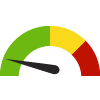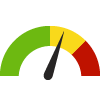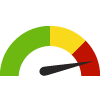Advanced Search: Build a Custom Dashboard
In the fields below, search for indicators by location, topics, population, classification, subgroup, or comparison. No fields are required, but we suggest selecting a location or two to start. In the additional search options section, select options to group and order search results. To learn more about how to customize a dashboard, see our help center.
Visit the Indicator List Page to see the full list of indicators and locations available on the site.
Search Results:
Indicator Gauge Icon Legend
Legend Colors
Red is bad, green is good, blue is not statistically different/neutral.
Compared to Distribution
 the value is in the best half of communities.
the value is in the best half of communities.
 the value is in the 2nd worst quarter of communities.
the value is in the 2nd worst quarter of communities.
 the value is in the worst quarter of communities.
the value is in the worst quarter of communities.
Compared to Target
 meets target;
meets target;  does not meet target.
does not meet target.
Compared to a Single Value
 lower than the comparison value;
lower than the comparison value;
 higher than the comparison value;
higher than the comparison value;
 not statistically different from comparison value.
not statistically different from comparison value.
Trend

 non-significant change over time;
non-significant change over time; 
 significant change over time;
significant change over time;  no change over time.
no change over time.
Compared to Prior Value
 higher than the previous measurement period;
higher than the previous measurement period;
 lower than the previous measurement period;
lower than the previous measurement period;
 no statistically different change from previous measurement period.
no statistically different change from previous measurement period.
Health / Adolescent Health
Health / Adolescent Health
County: Hawaii
County: Hawaii Abstain From Sex- Teen Boys
County: Hawaii Abstain From Sex- Teen Boys




County: Hawaii Abstain From Sex- Teen Girls
County: Hawaii Abstain From Sex- Teen Girls




County: Hawaii Abstain From Sex- Young Teen Boys
County: Hawaii Abstain From Sex- Young Teen Boys



County: Hawaii Abstain From Sex- Young Teen Girls
County: Hawaii Abstain From Sex- Young Teen Girls



County: Hawaii Births to Mothers Under 18 Years
County: Hawaii Births to Mothers Under 18 Years



County: Hawaii Children Who Drank Soda with Sugar Yesterday
County: Hawaii Children Who Drank Soda with Sugar Yesterday



County: Hawaii Children Who Drank Sugar-Sweetened Beverages Yesterday
County: Hawaii Children Who Drank Sugar-Sweetened Beverages Yesterday



County: Hawaii Children Who Drank Sweetened Drinks Yesterday
County: Hawaii Children Who Drank Sweetened Drinks Yesterday



County: Hawaii Children Who Eat Fast Food at Least Once Per Week
County: Hawaii Children Who Eat Fast Food at Least Once Per Week



County: Hawaii Condom Use Among Teen Boys
County: Hawaii Condom Use Among Teen Boys



County: Hawaii Deaths Among Youth Aged 1-19 Years
County: Hawaii Deaths Among Youth Aged 1-19 Years




County: Hawaii Households that Received Pediatric Medical Services
County: Hawaii Households that Received Pediatric Medical Services




County: Hawaii Illegal Drugs on School Property HS
County: Hawaii Illegal Drugs on School Property HS



County: Hawaii Illegal Drugs on School Property MS
County: Hawaii Illegal Drugs on School Property MS


County: Hawaii Illegal Tobacco Sales
County: Hawaii Illegal Tobacco Sales




County: Hawaii Intimate Partner Violence Among Teens
County: Hawaii Intimate Partner Violence Among Teens




County: Hawaii Intimate Partner Violence Among Young Teens
County: Hawaii Intimate Partner Violence Among Young Teens



County: Hawaii LGB Teens Who Are Bullied
County: Hawaii LGB Teens Who Are Bullied





County: Hawaii LGB Teens Who Use Illicit Drugs
County: Hawaii LGB Teens Who Use Illicit Drugs




County: Hawaii LGB Teens with Suicidal Thoughts
County: Hawaii LGB Teens with Suicidal Thoughts





County: Hawaii LGB Young Teens with Suicidal Thoughts
County: Hawaii LGB Young Teens with Suicidal Thoughts

County: Hawaii Pregnancies Among Females Aged 15-19 Years
County: Hawaii Pregnancies Among Females Aged 15-19 Years





County: Hawaii Property Crime Perpetrated by Adolescents and Young Adults
County: Hawaii Property Crime Perpetrated by Adolescents and Young Adults



County: Hawaii Teen Birth Rate
County: Hawaii Teen Birth Rate




County: Hawaii Teen Boys Who Binge Drink
County: Hawaii Teen Boys Who Binge Drink




County: Hawaii Teen Fruit and Vegetable Consumption
County: Hawaii Teen Fruit and Vegetable Consumption









County: Hawaii Teen Girls Who Binge Drink
County: Hawaii Teen Girls Who Binge Drink




County: Hawaii Teens Who Are Bullied
County: Hawaii Teens Who Are Bullied




County: Hawaii Teens Who Are Cyberbullied
County: Hawaii Teens Who Are Cyberbullied




County: Hawaii Teens who are Obese
County: Hawaii Teens who are Obese




County: Hawaii Teens who are Overweight
County: Hawaii Teens who are Overweight




County: Hawaii Teens Who Attempted Suicide
County: Hawaii Teens Who Attempted Suicide




County: Hawaii Teens Who Attend Daily Physical Education
County: Hawaii Teens Who Attend Daily Physical Education






County: Hawaii Teens Who Binge Drink
County: Hawaii Teens Who Binge Drink





County: Hawaii Teens Who Drink Non-Diet Soda or Pop at Least Once Per Day
County: Hawaii Teens Who Drink Non-Diet Soda or Pop at Least Once Per Day








County: Hawaii Teens Who Drink Sweetened Juice Drinks at Least Once Per Day
County: Hawaii Teens Who Drink Sweetened Juice Drinks at Least Once Per Day



County: Hawaii Teens Who Engage in Regular Physical Activity
County: Hawaii Teens Who Engage in Regular Physical Activity




County: Hawaii Teens Who Ever Tried E-Cigarettes
County: Hawaii Teens Who Ever Tried E-Cigarettes





County: Hawaii Teens Who Ever Used illicit drugs
County: Hawaii Teens Who Ever Used illicit drugs



County: Hawaii Teens Who Frequently Use E-Cigarettes
County: Hawaii Teens Who Frequently Use E-Cigarettes




County: Hawaii Teens Who Get Mental Health Help They Need
County: Hawaii Teens Who Get Mental Health Help They Need


County: Hawaii Teens Who Get Sufficient Sleep
County: Hawaii Teens Who Get Sufficient Sleep





County: Hawaii Teens Who Got E-Cigarettes from a Retailer
County: Hawaii Teens Who Got E-Cigarettes from a Retailer


County: Hawaii Teens Who Got E-Cigarettes from Social Source
County: Hawaii Teens Who Got E-Cigarettes from Social Source


County: Hawaii Teens Who Got E-Cigarettes from the Internet
County: Hawaii Teens Who Got E-Cigarettes from the Internet


County: Hawaii Teens Who Had a Physical in the Past Year
County: Hawaii Teens Who Had a Physical in the Past Year




County: Hawaii Teens Who Have Ever Tried a Cigarette
County: Hawaii Teens Who Have Ever Tried a Cigarette





County: Hawaii Teens Who Have Used Methamphetamines
County: Hawaii Teens Who Have Used Methamphetamines




County: Hawaii Teens Who Meet Aerobic and Muscle-Strengthening Guidelines
County: Hawaii Teens Who Meet Aerobic and Muscle-Strengthening Guidelines




County: Hawaii Teens Who Meet Aerobic Physical Activity Guidelines
County: Hawaii Teens Who Meet Aerobic Physical Activity Guidelines






County: Hawaii Teens Who Meet Muscle-Strengthening Guidelines
County: Hawaii Teens Who Meet Muscle-Strengthening Guidelines






County: Hawaii Teens Who Saw a Dentist in the Past Year
County: Hawaii Teens Who Saw a Dentist in the Past Year





County: Hawaii Teens Who Skipped School for Safety
County: Hawaii Teens Who Skipped School for Safety




County: Hawaii Teens Who Smoke Cigarettes
County: Hawaii Teens Who Smoke Cigarettes






County: Hawaii Teens Who Smoke Menthol Cigarettes
County: Hawaii Teens Who Smoke Menthol Cigarettes


County: Hawaii Teens Who Texted or Emailed While Driving
County: Hawaii Teens Who Texted or Emailed While Driving



County: Hawaii Teens Who Use Alcohol
County: Hawaii Teens Who Use Alcohol





County: Hawaii Teens Who Use E-Cigarettes
County: Hawaii Teens Who Use E-Cigarettes






County: Hawaii Teens Who Use E-Cigarettes Due to Flavors
County: Hawaii Teens Who Use E-Cigarettes Due to Flavors


County: Hawaii Teens Who Use Marijuana
County: Hawaii Teens Who Use Marijuana





County: Hawaii Teens Who Use Sunscreen
County: Hawaii Teens Who Use Sunscreen





County: Hawaii Teens Who Were in a Physical Fight
County: Hawaii Teens Who Were in a Physical Fight




County: Hawaii Teens with 2 Hours or Less of Computer and Video Game Time
County: Hawaii Teens with 2 Hours or Less of Computer and Video Game Time





County: Hawaii Teens with 2 Hours or Less of TV Time
County: Hawaii Teens with 2 Hours or Less of TV Time





County: Hawaii Teens with a Healthy Body Weight
County: Hawaii Teens with a Healthy Body Weight





County: Hawaii Teens with an Adult They Can Talk To
County: Hawaii Teens with an Adult They Can Talk To




County: Hawaii Teens With Disordered Eating
County: Hawaii Teens With Disordered Eating


County: Hawaii Teens with Recent Depression
County: Hawaii Teens with Recent Depression




County: Hawaii Teens with Suicidal Thoughts
County: Hawaii Teens with Suicidal Thoughts




County: Hawaii Traumatic Brain Injury-Related ED Visit Rate
County: Hawaii Traumatic Brain Injury-Related ED Visit Rate


County: Hawaii Traumatic Brain Injury-Related Hospitalization Rate
County: Hawaii Traumatic Brain Injury-Related Hospitalization Rate


County: Hawaii Violent Crime Perpetrated by Adolescents and Young Adults
County: Hawaii Violent Crime Perpetrated by Adolescents and Young Adults



County: Hawaii Young Teens Who Are Bullied
County: Hawaii Young Teens Who Are Bullied



County: Hawaii Young Teens Who Are Cyberbullied
County: Hawaii Young Teens Who Are Cyberbullied



County: Hawaii Young Teens Who Attend Daily Physical Education
County: Hawaii Young Teens Who Attend Daily Physical Education




County: Hawaii Young Teens Who Binge Drink
County: Hawaii Young Teens Who Binge Drink




County: Hawaii Young Teens Who Engage in Regular Physical Activity
County: Hawaii Young Teens Who Engage in Regular Physical Activity



County: Hawaii Young Teens Who Ever Attempted Suicide
County: Hawaii Young Teens Who Ever Attempted Suicide



County: Hawaii Young Teens Who Ever Tried E-Cigarettes
County: Hawaii Young Teens Who Ever Tried E-Cigarettes




County: Hawaii Young Teens Who Frequently Use E-Cigarettes
County: Hawaii Young Teens Who Frequently Use E-Cigarettes



County: Hawaii Young Teens Who Get Mental Health Help They Need
County: Hawaii Young Teens Who Get Mental Health Help They Need


County: Hawaii Young Teens Who Get Sufficient Sleep
County: Hawaii Young Teens Who Get Sufficient Sleep




County: Hawaii Young Teens Who Got E-Cigarettes from a Retailer
County: Hawaii Young Teens Who Got E-Cigarettes from a Retailer


County: Hawaii Young Teens Who Got E-Cigarettes from Social Source
County: Hawaii Young Teens Who Got E-Cigarettes from Social Source


County: Hawaii Young Teens Who Got E-Cigarettes from the Internet
County: Hawaii Young Teens Who Got E-Cigarettes from the Internet


County: Hawaii Young Teens Who Had a Physical in the Past Year
County: Hawaii Young Teens Who Had a Physical in the Past Year



County: Hawaii Young Teens Who Have Ever Tried a Cigarette
County: Hawaii Young Teens Who Have Ever Tried a Cigarette




County: Hawaii Young Teens Who Have Used Methamphetamines
County: Hawaii Young Teens Who Have Used Methamphetamines






County: Hawaii Young Teens Who Meet Aerobic Physical Activity Guidelines
County: Hawaii Young Teens Who Meet Aerobic Physical Activity Guidelines




County: Hawaii Young Teens Who Meet Muscle-Strengthening Guidelines
County: Hawaii Young Teens Who Meet Muscle-Strengthening Guidelines




County: Hawaii Young Teens Who Saw a Dentist in the Past Year
County: Hawaii Young Teens Who Saw a Dentist in the Past Year




County: Hawaii Young Teens Who Skipped School for Safety
County: Hawaii Young Teens Who Skipped School for Safety



County: Hawaii Young Teens Who Smoke Cigarettes
County: Hawaii Young Teens Who Smoke Cigarettes





County: Hawaii Young Teens Who Smoke Menthol Cigarettes
County: Hawaii Young Teens Who Smoke Menthol Cigarettes


County: Hawaii Young Teens Who Use Alcohol
County: Hawaii Young Teens Who Use Alcohol




County: Hawaii Young Teens Who Use E-Cigarettes
County: Hawaii Young Teens Who Use E-Cigarettes





County: Hawaii Young Teens Who Use Marijuana
County: Hawaii Young Teens Who Use Marijuana




County: Hawaii Young Teens Who Use Sunscreen
County: Hawaii Young Teens Who Use Sunscreen



County: Hawaii Young Teens Who Were in a Physical Fight
County: Hawaii Young Teens Who Were in a Physical Fight







County: Hawaii Young Teens with 2 Hours or Less of TV Time
County: Hawaii Young Teens with 2 Hours or Less of TV Time




County: Hawaii Young Teens with an Adult They Can Talk To
County: Hawaii Young Teens with an Adult They Can Talk To




County: Hawaii Young Teens With Disordered Eating
County: Hawaii Young Teens With Disordered Eating


County: Hawaii Young Teens with Ever Depression
County: Hawaii Young Teens with Ever Depression



County: Hawaii Young Teens with Suicidal Thoughts
County: Hawaii Young Teens with Suicidal Thoughts




